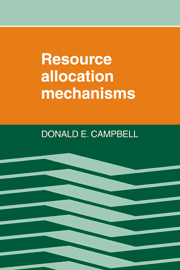Book contents
- Frontmatter
- Contents
- Preface
- Chapter 1 Introduction
- Chapter 2 Performance criteria
- Chapter 3 The Arrow–Debreu world
- Chapter 4 Uncertainty
- Chapter 5 Incentive compatibility
- Chapter 6 Existence of a competitive equilibrium
- Chapter 7 Welfare properties of the Walrasian mechanism
- Appendix 1 Elements of consumer choice
- Appendix 2 The Edgeworth exchange economy
- Appendix 3 Proof of the Shafer–Sonnenschein theorem
- References
- Author index
- Subject index
Chapter 1 - Introduction
Published online by Cambridge University Press: 05 June 2012
- Frontmatter
- Contents
- Preface
- Chapter 1 Introduction
- Chapter 2 Performance criteria
- Chapter 3 The Arrow–Debreu world
- Chapter 4 Uncertainty
- Chapter 5 Incentive compatibility
- Chapter 6 Existence of a competitive equilibrium
- Chapter 7 Welfare properties of the Walrasian mechanism
- Appendix 1 Elements of consumer choice
- Appendix 2 The Edgeworth exchange economy
- Appendix 3 Proof of the Shafer–Sonnenschein theorem
- References
- Author index
- Subject index
Summary
This book is concerned with the general welfare implications of individual decisions in systems in which some sort of coordination of individual activities is essential to the achievement of a high level of overall welfare. What makes this problematic is the determination of each individual to act in a way that enhances his or her personal well-being. Different configurations of individual decisions produce different outcomes, some of which could be improved upon to the extent of making everyone better off and most of which favor some of the individuals more than others. Even though it will be difficult to claim that a system promotes the general welfare when there will always be some individuals who protest, accurately, that another arrangement would have gone further toward satisfying their material wants, there is no ambiguity in the requirement that a test of welfare be based, somehow, on individual assessments of the outcomes.
We begin, therefore, with a desire to determine which outcomes will emerge and whether these will satisfactorily reflect the tastes and values of the individuals participating in the system. In most economic settings there will be a large number of possible outcomes. It will be assumed at the outset that of all the outcomes that are likely to emerge, only the equilibrium outcomes are worthy of attention. In an abstract model of an economy an equilibrium is a state in which all forces are in balance and there is no tendency to change: No agent wishes to revise his decision having observed this state and, because the decisions do not change, the original outcome is maintained.
Information
- Type
- Chapter
- Information
- Resource Allocation Mechanisms , pp. 1 - 16Publisher: Cambridge University PressPrint publication year: 1987
